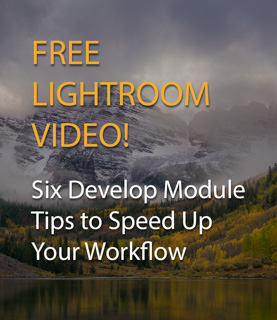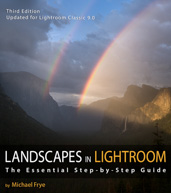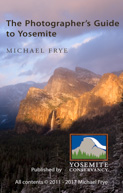In the Moment:
Michael Frye's Landscape Photography Blog
by Michael Frye | Oct 1, 2021 | Travels and Stories
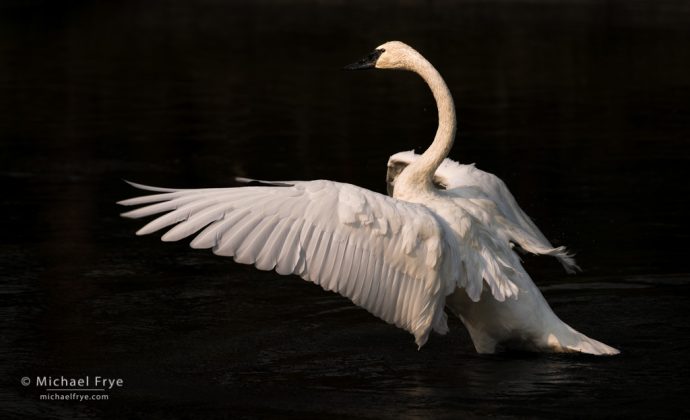
Trumpeter Swan, on our first morning in Yellowstone
On our first morning in Yellowstone, as we were driving back to our campsite, Claudia and I spotted a trumpeter swan along the Firehole River. Claudia pulled into a turnout, while I jumped out of the car, grabbed my camera and 100-400mm zoom, and walked back along the river toward the swan. Our friends Charlotte and Gary Gibb soon pulled into the turnout behind Claudia.
I wasn’t sure, at first, how skittish the swan might be, so I approached cautiously. But I needn’t have worried, as it soon became apparent that the swan was completely unafraid of people. It was feeding along the opposite bank of the river, with messy logs and branches behind it. Then it swam right toward me, stopped in the middle of the river (with a perfect dark background behind it), flapped its wings, and settled down to start preening. Claudia, Charlotte, and Gary witnessed this from the turnout and insisted that the swan was performing for me, but I think it was just random coincidence.
(more…)
by Michael Frye | Sep 26, 2021 | Light and Weather, Travels and Stories
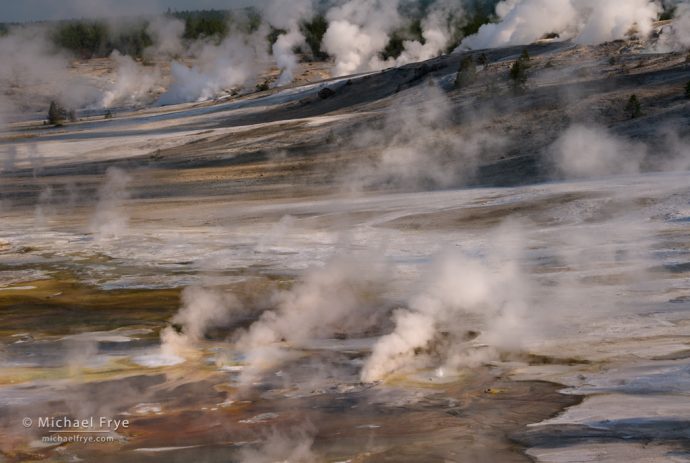
Steaming earth, Yellowstone National Park
Last spring I did a presentation for Out of Chicago Live called The Dynamic Landscape. It’s a topic I’ve been thinking about for awhile, because I realized that I view the landscape not as something fixed and immutable, but as as a living, breathing, constantly changing organism.
And that view heavily influences my photography. I respond to the changes around me with my feet, my eyes, and my camera as I adapt to light, weather, and other conditions.
(more…)
by Michael Frye | Sep 11, 2021 | Travels and Stories
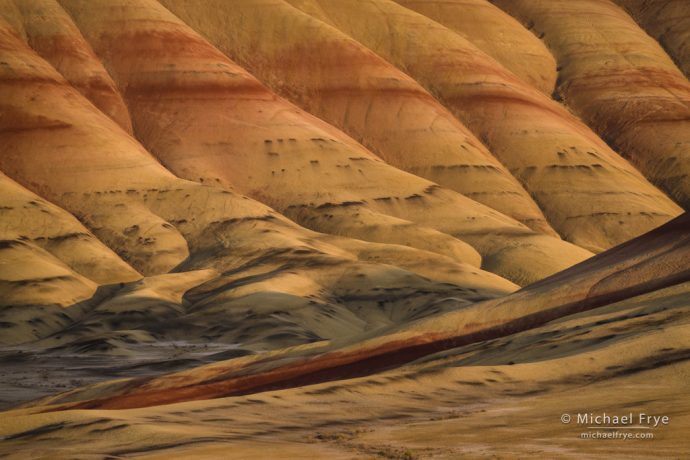
Late-afternoon light, Oregon badlands
Claudia and I are in the middle of a long camping trip. We started in Oregon, then moved to Idaho, and for the last ten nights we’ve been in Yellowstone.
One of our stops was in the badlands of eastern Oregon. These badlands encompass a small area, but they’re colorful, and full of beautiful patterns. I love patterns, as you probably know, so I was like a kid in a candy store, finding new compositions everywhere I looked. I used telephoto lenses almost exclusively, picking designs out of the sculpted earth.
(more…)
by Michael Frye | Aug 15, 2021 | Night Photography
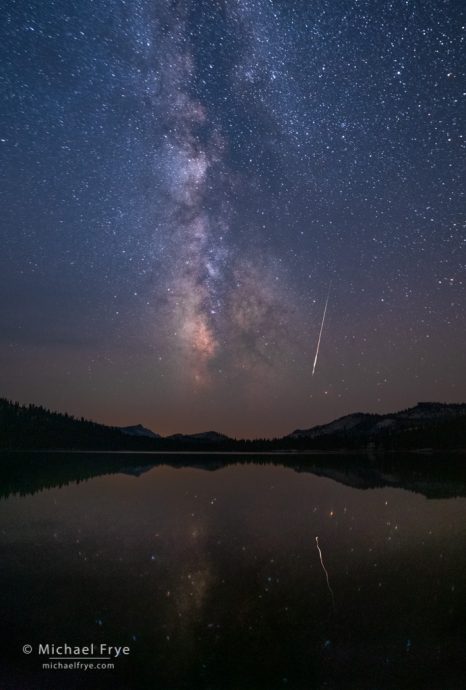
Milky Way and meteor reflected in an alpine lake, Yosemite NP, California. The meteor’s reflection is squiggly because the water was slightly rippled. I blended 20 exposures (each 16mm, 30 seconds at f/4, ISO 6400) with Starry Landscape Stacker to reduce noise. That kind of blending wipes out short-lived light sources, like car headlights or jet trails, which is usually a great thing. But in this case it also wiped out the meteor and its reflection, so I took that one meteor frame into Photoshop, and blended it with the TIFF output from Starry Landscape Stacker to create the final image.
On Thursday evening Claudia and I decided to head up to Yosemite to watch the Perseid meteor shower. Although you can see more Perseid meteors during the early-morning hours, we knew from previous experience that those early-morning meteors rain down from directly overhead, so although numerous, their paths are short. But during the evening you’re much more likely to see an “earth-grazer” – a meteor that glances across the atmosphere at an angle, making a long, bright streak through the sky. So although evening meteors are less abundant, the ones you do see are often more spectacular.
We made our way to a high-country lake. I set up my camera, then we laid out our stadium chairs to watch the show. Only it wasn’t much of a show at first. For a long time we saw no meteors whatsoever, earth-grazers or otherwise. Finally we saw some small ones. And then, eventually, I saw a big, bright, beautiful earth-grazer streak across half the sky. But Claudia missed it. Eventually we saw a few more earth-grazers, though none as bright as that first one.
(more…)
by Michael Frye | Aug 5, 2021 | Announcements
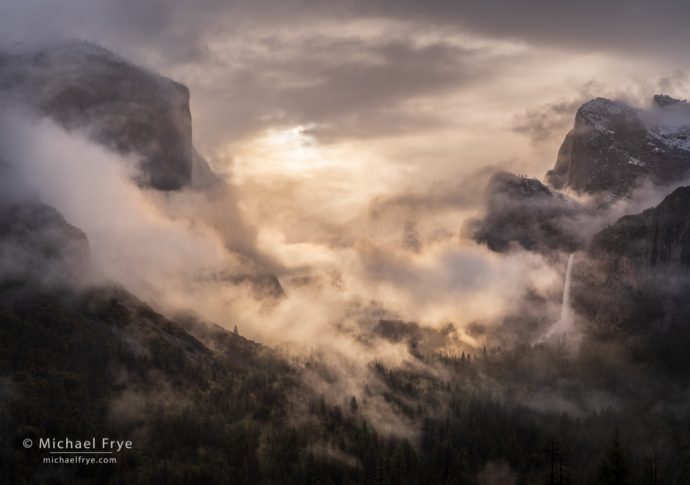
Misty sunrise from Tunnel View, Yosemite
If you haven’t heard yet, there’s a new photography competition called the Natural Landscape Photography Awards. It is, in their words, a competition “celebrating the artistic achievements of landscape photographers who dedicate themselves to capturing the beauty of the landscape in a realistic manner.”
Now let me say up front that I don’t think art should have any limits, and people should be free to create anything they want, in any manner they want (as long as they’re not harming anyone or deliberately deceiving people about how an image was made).
But in my own work I try to celebrate the beauty and variety of nature. I think the natural world is wonderful and amazing, and I try to show that without enhancing my images in an unrealistic way. Plus, for me, part of the fun of landscape photography is trying to put myself in the right place at the right time to see some of the most beautiful places in the world at their most beautiful moments. It changes the game – and for me, decreases the enjoyment – if I can just add in a different sky later.
(more…)
by Michael Frye | Aug 1, 2021 | Light and Weather, Travels and Stories
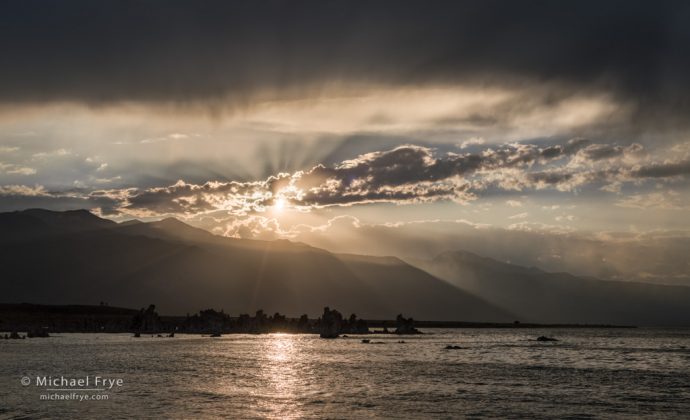
Sun setting over Mono Lake, California. Anticipating that sunbeams might appear to the west, I moved to line up the sun with some tufa formations, and captured this scene as the sun broke through a bank of clouds. Five frames, two stops apart, each at 50mm, f/11, and ISO 100, blended with Lightroom’s HDR Merge.
If you’re used to lakes in other parts of the world, Mono Lake might seem like a strange place. The water is salty – two to three times saltier than the ocean. It’s surrounded by sagebrush desert, and instead of trees along the shore you find those otherworldly tufa formations.
You won’t see many people swimming in Mono Lake. You won’t find lifeguards and buoys, windsurfers, or kids splashing in the water playing Marco Polo. Although the very-salty water allows people to float easily, it also leaves a salty and somewhat-soapy alkaline residue on the skin, with no convenient beachside showers available to rinse off in.
(more…)
by Michael Frye | Jul 15, 2021 | Light and Weather, Travels and Stories
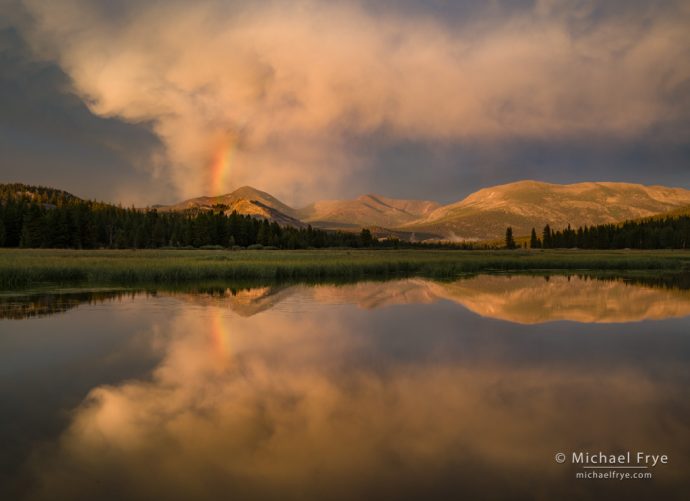
Rainbow and sunset clouds, Tuolumne Meadows, Yosemite NP, California. 35mm, 1/2 sec. at f/16, ISO 100.
If I were to make a list of my favorite places on earth, the Yosemite high country would have to be near the top. There’s something about the thin, pine-scented air, intense light, vast expanses of polished granite, and lakes sparkling in the sun…
I’ve spent a lot of time in this area over the last 40 years. I feel like this land is part of me, and me part of it. Some spots are as familiar to me as Yosemite Valley, and yet I’m still finding new places to explore.
(more…)
by Michael Frye | Jul 12, 2021 | Announcements
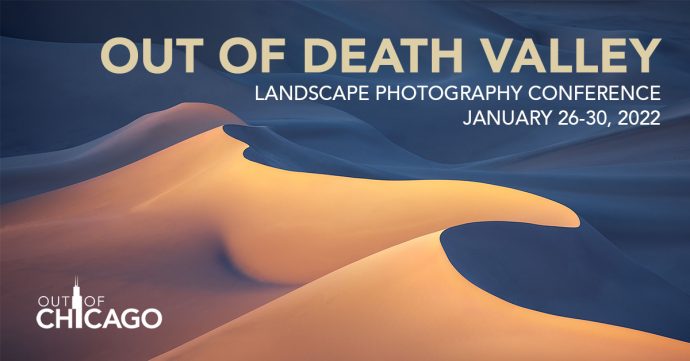
I’m thrilled to be joining the Out of Chicago team for another photography conference. This will be an in-person event – in Death Valley no less! – taking place next January 26-30, 2022.
The dunes and sculptured badlands of Death Valley are amazing, surreal, and beautiful locations for landscape photography. And I’ll be joining a wonderful cast of instructors, including Nick Page, David Kingham, Alex Noriega, Erin Babnik, Jennifer Renwick, John Barklay, Michael Gordon, Sarah Marino, Joshua Cripps, William Neill, Cole Thompson, Colleen Miniuk, TJ Thorne, and Eric Paré.
(more…)
by Michael Frye | Jul 4, 2021 | Light and Weather
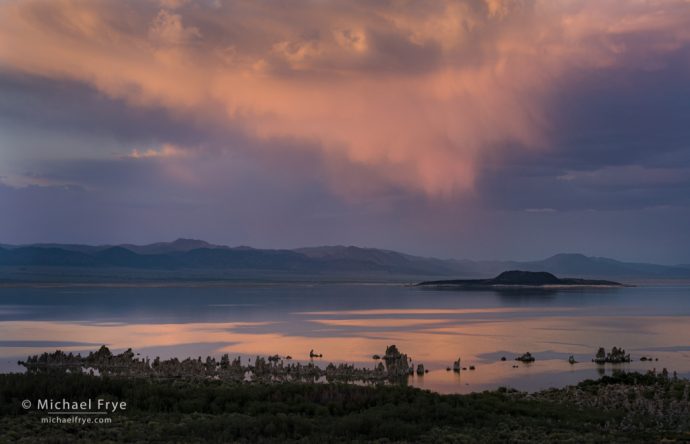
Clouds, tufa, and Negit Island at sunset, Mono Lake, California. This rain cloud lingered for awhile in the same location, allowing me to capture variations of this scene as the sun lowered, and the wind altered the reflections. 70mm, 1/15 sec. at f/11, ISO 100.
Mono Lake is a unique and beautiful place. It’s known for its tufa formations, but there’s so much more to it. It’s a giant pool surrounded by desert sage, and bounded by the peaks of the Sierra Nevada to the west. In summer, monsoonal moisture often arrives from the southeast and runs into that mountain wall, where the moisture gets pushed upward, forming clouds, showers, and thunderstorms. The lake becomes a vector for those storms.
While staying in Lee Vining a couple of weeks ago, we saw clouds and showers each afternoon, and had several opportunities to photograph beautiful evening light at the lake (along with a colorful sunrise). Under those conditions the lake can reflect clouds in wonderful ways, creating swaths of color and light across the sky and water.
(more…)
by Michael Frye | Jun 28, 2021 | Announcements
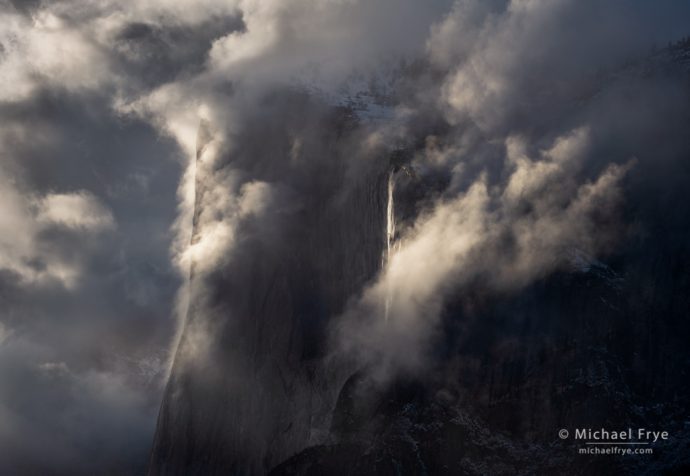
El Capitan emerging from clouds, Yosemite
I recently did an interview with David Johnston for his podcast The Landscape Photography Show, and it just got released today. David asked a lot of great questions, and I thought it was a fun and interesting conversation. We talked about my photographic journey, photographing the same place over and over, whether originality is overvalued, internal and external motivations for your work, and much more.
You can listen to the episode on David’s website, or through all the usual podcast sources like iTunes, Spotify, Stitcher, and so on.
(more…)











